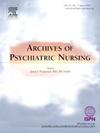Effect of assertiveness skills training on nursing students' competencies
IF 2.2
4区 医学
Q1 NURSING
引用次数: 0
Abstract
Background
Healthcare services require effective interaction with patients, their relatives, and members of the multidisciplinary team in complex and dynamic environments. Health professionals need well-developed communication skills to ensure that these interactions promote and maintain patient safety.
Aim
This study aimed to develop a cognitive behavioral therapy based assertiveness training program to improve the nursing students' competencies and to evaluate its effectiveness.
Methods
This study was conducted using a control group experimental design based on the pre-test and post-test model. The study was completed with 53 students, 28 and 25 in the training and the control groups, respectively. The cognitive behavioral therapy based assertiveness training applied in this study were conducted online via Zoom twice a week for a total of eight sessions. Survey data were analyzed using descriptive statistics, paired t-tests and independent sample t-test method.
Results
The assertiveness scores of the students in the training group increased significantly (p = 0.004), there was no significant change in the scores of those in the control group (p = 0.922). There was no statistically significant improvement in self-confidence (p = 0.180) and self-esteem levels after the training (p = 0.519).
Conclusions
The results showed that the training program provided a decrease in the passive behaviors of nursing students and an improvement in their assertive behaviors. Individuals can be enabled to recognize their needs and desires in communication, reject unrealistic requests, and express their feelings in a direct way with assertiveness training. Studies with larger sample groups and longer follow-up evaluations are recommended to be conducted in the future.
求助全文
约1分钟内获得全文
求助全文
来源期刊
CiteScore
3.70
自引率
0.00%
发文量
131
审稿时长
160 days
期刊介绍:
Archives of Psychiatric Nursing disseminates original, peer-reviewed research that is of interest to psychiatric and mental health care nurses. The field is considered in its broadest perspective, including theory, practice and research applications related to all ages, special populations, settings, and interdisciplinary collaborations in both the public and private sectors. Through critical study, expositions, and review of practice, Archives of Psychiatric Nursing is a medium for clinical scholarship to provide theoretical linkages among diverse areas of practice.

 求助内容:
求助内容: 应助结果提醒方式:
应助结果提醒方式:


